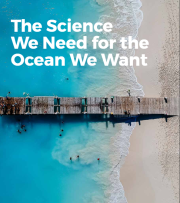s the largest marginal sea in the western Pacific, the South China Sea receives approximately 570 million tons of fluvial sediments annually through numerous rivers in adjacent continents and islands, including both world largest rivers (e.g., Pearl, Red, and Mekong) and small mountainous rivers (e.g., rivers in middle Vietnam, southwestern Taiwan, and Luzon). The river-borne terrigenous sediments have formed high sedimentation-rate deposits mostly on shelves of the South China Sea, and have recorded detailed climatic and environmental changes occurring in land source regions both naturally and anthropogenically.
To further understand how human activities affect sediment discharge and develop scenarios of future changes, the Intergovernmental Oceanographic Commission Sub-Commission for the Western Pacific (WESTPAC) approved the project “Fluvial Sediment Supply to the South China Sea: Anthropogenic and Natural Aspects (FluSed)” at its 7th Session in May 2008 and extended it in 2010.
FluSed Objectives:
– To investigate fluvial sediment discharge to the South China Sea: fractionating anthropogenic influence from natural trend.
– To determine source and transport of sediments in the South China Sea during the geological past.
– To predict the future sediment discharge: recommendation to governors.
In its first phase of implementation, three workshops were organized to provide a platform for scientists surrounding the South China Sea and in other regions to share their scientific knowledge, address data gaps and stimulate new ideas on the study of the fluvial sediment discharge.
The first and second workshops were held in Tongji University at Shanghai.
The third workshop was held in Quezon City, Philippines with the host of the University of the Philippines, and financial support of the State Key Laboratory of Marine Geology (Tongji University). Total 12 presentations were given on topic of fluvial sediment discharge estimation, coastline changes in several regions surrounding the South China Sea, quantitative determination of clay-sized sediments to the South China Sea, and Late Quaternary paleoenvironmental study in the South China Sea. Participants gathered to show their new data and interpretations for the fluvial sediment study. Further cooperation strategies were achieved during the discussion session, and they mainly include: more sampling fieldworks in the coming year in Philippines and Thailand, potential cooperation cruises in the South China Sea, cooperative laboratory analysis on delta and deep-sea cores, and co-authored writing for international journal articles, etc. Participants were agreed to have a special issue in Journal of Asian Earth Science in 2011 to publish their scientific results.
The workshop finally decided to have the next annual workshop in Bangkok, Thailand during November 2011.




